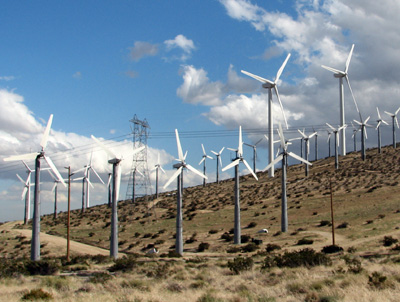Prop 7 Renewable Energy Generation
Prop. 7 tries to accomplish the noble and essential goal of securing more renewable energy for California, but its approach and unclear wording could ultimately undermine growth of clean energy sources.
Currently, the state obtains about 11 percent of its electricity from renewable energy sources, including solar, wind, geothermal and biomass, with the goal of increasing that to 20 percent by 2017. Prop. 7 would accelerate the schedule and raise the bar by requiring all utilities to generate 20 percent of power from renewable by 2010, and 50 percent by 2025.
Despite this apparently pro-green mission, Prop. 7 is opposed by most major environmental groups, including the Sierra Club and the League of Conservation Voters, for three key reasons.
First, the measure seeks to fast-track the government approval process of new clean energy plants, which could lessen oversight and weaken environmental protections.
Second, increases on consumers’ bills from renewable energy would be capped at 3 percent annually, while the bill fails to require a similar price cap for energy obtained from fossil fuels.
Finally, small-scale renewable utility companies that produce less than 30 megawatts could have more difficulty operating if this bill passes. That would lessen or eliminate community control over energy policies.
While the measure may be well-intentioned, its potential unintended consequences outweigh its possible benefits. Although renewable energy policies need to be enacted on state and local levels, a flawed ballot measure is not the way to accomplish those goals.
Prop 8 Eliminates Right of Same-Sex Couples to Marry
On March 11, 2004, San Francisco’s City Hall rang with laughter and tears in the surge of emotion uncorked when Mayor Gavin Newsom made same-sex marriage a legal reality. Later that day, the state Supreme Court ordered the city to cease and desist in its unilateral display of tolerance and love. But two months later, on May 15, that same Supreme Court overturned the state’s ban on gay marriage, and California became one of two states in the nation to reject the bigotry that has denied gay couples this fundamental human right. (The other is Massachusetts.)
On paper Prop. 8 is an issue of semantics. When it was first submitted, it came titled as the “California Marriage Protection Act,” implying that the very institution of marriage would be hurt should same-sex couples be allowed to wed.
Prop. 8’s title was sensibly changed by Attorney General Jerry Brown to “Limit on Marriage”—and then, after the state Supreme Court legalized same-sex marriage in May of this year, changed again, to “Eliminates Right of Same-Sex Couples to Marry.” Prop. 8’s conservative supporters, including the Mormon Church—which has called on its members to funnel millions into the campaign from around the globe—are at issue with the very simple language in the new title.
Supporters of Prop. 8 try to argue that same-sex couples already have the same domestic partnership rights of married couples in California. Hence, the only thing they’re concerned about, they say, is whether same-sex couples get to say they’re “married.” It’s important to remember that the definitions of words change constantly. Remember when “gay” meant happy? For “marriage,” those societal changes have already taken effect, and it’s time to allow the definition to change accordingly.
By seeking to amend the California Constitution to eliminate the right of same-sex couples to marry in California, proponents of Prop. 8 are not “protecting” marriage. They aren’t “defending” marriage. There is nothing to be lost in the institution of marriage by expanding its definition to include same-sex couples.


We must stop discrimination and inequality by defeating Prop 8. Separate but equal does not mean equality. Please VOTE NO on Prop 8, don’t discriminate!
Ideally, our government would not be involved in matters such as marriage. It makes as little sense as them recognizing a baptism or bris. People revere these events as sacred, which means they should be distinct from public law.
However, since that option is not on the ballot, I’d much rather this proposition get voted down. Declaring social inequality is a much more dangerous precedent to set.
I don’t see how we can honor people who fought civil rights battles decades ago while actually considering a ban such as this. We look at some theocracies in the east and wonder how they can be so archaic in their ways, yet we slowly creep in that direction ourselves. I guess it’s hard to explain devolution to people who don’t believe in evolution in the first place.
In response to the article on Prop 7, I would like to clear some things up.
The Sierra Club has it dead wrong. First, Prop 7 does fast-track any renewable energy plant that is more than 30 megawatts, but only after it adheres to all environmental reviews and laws including the Desert Protection Act.
Second, by capping the price of fossil fuels is NOT a reason to oppose a proposition that is seriously addressing global warming pollution, 40% of which comes from electricity generation.
Third, there is no restriction on small renewable. Note the word ‘could’. Anything could happpen, but again if this did go to court, this argument would easily be thrown out simply because it is outright absurd!
I am ashamed that enviros are using utility money to oppose prop 7 on no grounds whatsoever.
We all need to vote YES ON 7!
2- There is no such thing as equality.